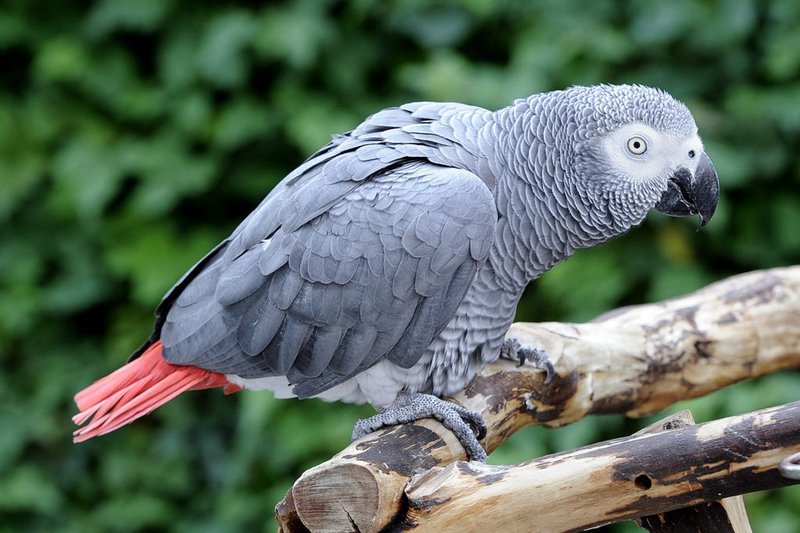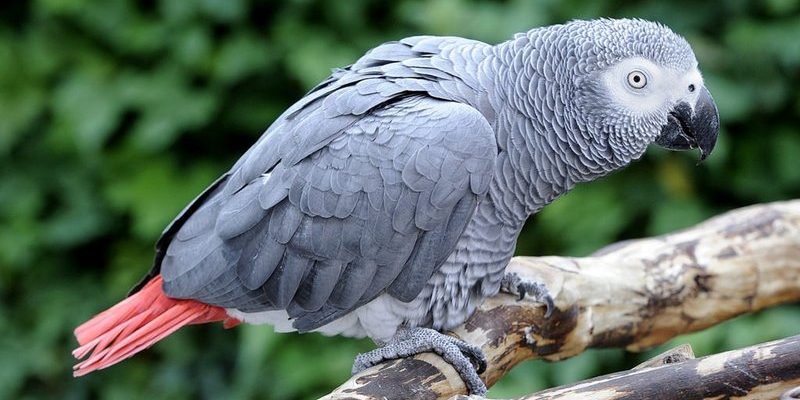
Imagine sitting in your living room, and suddenly, your feathered friend starts chatting away. That’s the magic of the African Grey Parrot. Recognized for their extraordinary speaking abilities and remarkable intelligence, these birds have captured the hearts of many avian enthusiasts and pet owners alike. They’re not just pets; they’re companions that bring joy, laughter, and a splash of vibrant personality into your life.
The African Grey Parrot is a medium-sized parrot known for its striking gray feathers and captivating red tail. They are not only beautiful to look at but also incredibly social creatures. Their ability to mimic human speech and sounds makes them fascinating pets, but it also means they require plenty of attention and stimulation. Let’s dive into what makes these parrots so unique!
Physical Characteristics
The appearance of the African Grey Parrot is nothing short of distinctive. With a body length averaging between 12 to 14 inches, they have a robust build and a sturdy beak designed for cracking nuts and seeds. Their feathers are a beautiful slate gray, accented by a bright red or maroon tail that adds a splash of color. One of their most notable features is their striking, expressive eyes, which can convey a range of emotions, from curiosity to mischief.
Male and female African Greys are quite similar in appearance, which makes determining their sex a bit tricky unless you go for a DNA test. Both genders exhibit the same vibrant feathers and sharp beaks. However, there are subtle behavioral differences, with males often being slightly larger and exhibiting more dominant behaviors. This is something to consider when thinking about keeping more than one of these clever birds!
Table of Physical Facts
| Size: | 12-14 inches |
| Weight: | 400-600 grams |
| Lifespan: | 40-60 years in captivity |
| Habitat: | Tropical rainforests of Central and West Africa |
| Diet: | Seeds, nuts, fruits, and vegetables |
| Color: | Gray body with a red tail |
Natural Habitat
The African Grey Parrot originates from the lush, tropical rainforests of Central and West Africa. This rich environment provides them with abundant natural resources, including a variety of fruits, seeds, and nuts. In the wild, they thrive in flocks, which not only offers them protection but also fulfills their social needs.
These parrots prefer to live high up in the canopy, where they can find food and evade predators. This means they have evolved superb climbing abilities and strong wings, allowing them to navigate through trees with ease. The noise of their chirps and calls can often be heard in the jungle, marking their territories and communicating with each other. Their social structure is complex, and they engage in playful behaviors, often seen swinging from branches and playing with each other.
Diet and Nutrition
Feeding your African Grey Parrot a well-balanced diet is crucial for its health and longevity. In the wild, their diet primarily consists of seeds, nuts, fruits, and, occasionally, insects. As a pet owner, you can replicate this diet with a high-quality pellet mix specifically made for parrots, supplemented with fresh fruits and veggies. Think of it as crafting a colorful, nutritious feast every day!
Some favorite foods of African Greys include apples, carrots, bananas, and leafy greens. However, it’s important to remember that certain foods are harmful, such as avocado, chocolate, and caffeine. So, always do your research and consult with a vet to ensure your feathered friend is getting the best nutrition possible.
Behavior and Personality
The personality of an African Grey Parrot is one of its most captivating traits. Known for their intelligence, these birds are often compared to a toddler in terms of their emotional and cognitive capabilities. They can solve puzzles, mimic sounds, and even learn to identify objects by name. This intelligence is what makes them so endearing, but it also means they require a lot of mental stimulation. Boredom can lead to destructive behaviors, so keeping them engaged is vital.
Social creatures at heart, African Greys thrive on interaction. They enjoy playing with toys, engaging in games with their owners, and often require significant amounts of attention. If you’re considering adopting one, be prepared for a chatty, occasionally demanding companion who loves to be the center of attention. They can even develop strong bonds with their owners, sometimes preferring them over other family members.
Training and Socialization
When it comes to training, the African Grey Parrot is quite capable but also a bit of a challenge. Their intelligence means they can learn commands and tricks quickly, but it also means they can be easily bored with repetitive tasks. Start by teaching basic commands, using positive reinforcement techniques like treats and praise. This is where building a solid relationship with your bird pays off!
Socialization is critical for African Greys, especially during their younger years. Exposing them to different people, sounds, and environments will help them become well-adjusted adults. This is essential to prevent fear-based behaviors or aggression. Gradually introducing new experiences can make a world of difference, turning a potentially fearful parrot into a confident companion.
Health and Care
Caring for an African Grey Parrot involves more than just feeding and socializing. Regular veterinary check-ups are vital for maintaining their health. African Greys can be prone to certain health issues, including feather plucking, which can be a sign of stress or boredom. If you notice your bird engaging in this behavior, it’s essential to address the underlying cause, whether it’s environmental or emotional.
Proper hygiene is also essential. Ensuring their living environment is clean will prevent infections and keep them happy. Regularly changing their food and water, cleaning their cages, and providing opportunities for baths will go a long way in promoting their health.
Common Myths
There are some common misconceptions about the African Grey Parrot that we should clarify. One prevalent myth is that they can’t be trained or are difficult to handle. While they do require patience and socialization, many owners find them to be delightful learners. Another myth is that African Greys don’t need social interaction. In reality, they thrive on companionship and can become depressed if left alone for extended periods.
Understanding these myths and the reality behind them is crucial for anyone considering bringing an African Grey into their home. They are intricate, loving creatures that require commitment and care, but the rewards are endless—just ask any proud owner!
Choosing to bring an African Grey Parrot into your life is more than just adding a pet; it’s welcoming a new family member. With their incredible intelligence, vibrant personalities, and affectionate nature, they can fill your home with laughter and companionship. However, they also come with responsibilities and challenges. Being informed and prepared can make your journey with these feathered friends a joyful and fulfilling one.
FAQ
What is the lifespan of an African Grey Parrot?
The typical lifespan of an African Grey Parrot in captivity ranges from 40 to 60 years, although some can live even longer with proper care. This longevity is one of the reasons potential owners should consider their commitment carefully. Proper nutrition, a clean environment, and regular veterinary care play significant roles in ensuring your parrot lives a long and healthy life.
Do African Grey Parrots require a lot of attention?
Yes, African Grey Parrots need considerable attention and social interaction. They are social birds that thrive in companionship and can become bored or depressed if left alone for long periods. It’s vital to spend quality time with them daily, engaging in activities that stimulate their minds and satisfy their social needs.
Can African Grey Parrots talk?
African Grey Parrots are famous for their exceptional talking ability. They can learn to mimic human speech and various sounds, making them one of the best talkers among birds. Each parrot’s ability varies, but with consistent interaction and training, many owners find their Greys can learn numerous phrases and words effectively.
What should I feed my African Grey Parrot?
A balanced diet for an African Grey Parrot includes high-quality pellets, fresh fruits, and vegetables. Avoid items that are toxic to birds, such as avocado and chocolate. Regularly offering a variety of foods will keep your parrot healthy and interested in mealtime.
Are African Grey Parrots messy?
Like all parrots, African Grey Parrots can be quite messy. They often scatter food and debris as they eat, so it’s important to have a designated space for them and be ready to clean up after their meals. Regular cleaning of their cage and living area will help manage the mess and keep your home tidy.
Can African Grey Parrots live with other pets?
Integrating an African Grey Parrot with other pets can be done, but it requires careful supervision. Some birds may not get along with certain animals, especially if the other pets are predatory. It’s best to introduce them slowly and monitor interactions closely to ensure everyone feels safe.
What are the signs of a healthy African Grey Parrot?
Healthy African Grey Parrots typically exhibit bright, vibrant feathers, clear eyes, and an active, curious demeanor. They should have a normal appetite and engage in playful behavior. If you notice any changes in their behavior, eating habits, or appearance, it’s essential to consult a veterinarian for a check-up.
How can I help my African Grey Parrot bond with me?
Building a strong bond with your African Grey Parrot involves spending quality time together, engaging in play, and using positive reinforcement during training. Patience is key; allow your bird to get comfortable with you at its own pace. Regular interaction, gentle handling, and providing a safe environment will foster a loving relationship.
Is it possible to train an African Grey Parrot?
Absolutely! Training an African Grey Parrot is not only possible; it’s also enjoyable. These birds are intelligent and can learn commands, tricks, and even phrases with the right approach. Use positive reinforcement methods like treats and praise, and keep training sessions fun and short to maintain their interest.
Are African Grey Parrots prone to specific health issues?
Like many pets, African Grey Parrots can be prone to health issues such as feather plucking, respiratory infections, and obesity. Regular veterinary care, proper diet, and mental stimulation play crucial roles in preventing these issues and keeping your parrot healthy and happy.

